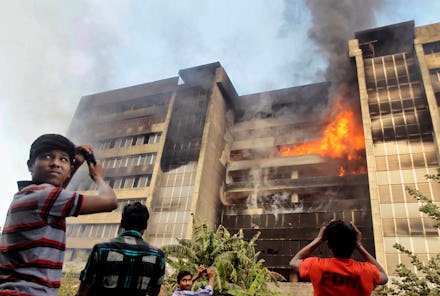This Was the Scene At a Walmart Factory in Bangladesh On Black Friday

The news: On Friday, as Americans kicked off the holiday shopping season by sprinting to malls, a 10-story garment factory that supplies apparel to the Gap, Walmart, and American Eagle was gutted by fire in Bangladesh, a country whose economy is dependent on its massive garment industry.
While no injuries were reported (the fire began overnight, when workers were out of the building), the conflagration again draws attention to working conditions in the second-largest exporter of garments to Western markets.
The background: Thanks to its low monthly minimum wage, which was $38 until last weekend, Bangladesh has developed a booming $20 billion garment industry, and become the second largest exporter of clothing in the world, behind China. The country’s apparel factories are largely concentrated in and around its capital, Dhaka (the burnt Standard Group factory is located about 25 miles outside the city), where the industry employs four million people and attracts young workers from rural sustenance farms across Bangladesh.
Bangladesh’s largely female garment workforce began taking to the streets earlier this year after April’s tragic Rana Plaza factory collapse killed 1,129 people. While the incident was far from the country’s first brush with factory disasters, it was the deadliest instance to date. Workers obtained the right to unionize, are demanding an increase in wages and an improvement in working conditions. Factory owners counter that such measures are likely to raise prices, and result in market losses to countries like Vietnam and Cambodia.
Which brings us back to Friday’s fire. A company official of the Standard Group, the Gap’s largest supplier in Bangladesh, claimed that the fire was started by workers who mistakenly believed that one of their peers was killed in a clash with police on Thursday night.
The takeaway: Bangladesh should be praised for making strides in responding to workers’ demands; over the weekend, the country’s minimum wage was raised to $68 per month, bringing it in line with similar exporters. Similarly, the non-North American manufacturers that signed onto a fire safety accord should be commended for doing so. However, continued improvements are necessary, as is vigilance on the part of the international community. As long as we continue to ship our cotton to Bangladesh and stock our retail outlets with the country’s garments, Americans should be obligated to consider the full cost of the products they’re purchasing and wearing, and the political conditions under which they’re produced.